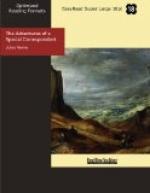Yes! My mind is made up. I will speak as soon as I have seen Zinca Klork. The poor girl must be told with consideration. The death of her betrothed must not come upon her like a thunderclap. Yes! To-morrow, as soon as we are at Pekin.
After all, if I do not say anything about Kinko, I may at least denounce Faruskiar and Ghangir and the four Mongols. I can say that I saw them go through the van, that I followed them, that I found they were talking on the gangway, that I heard the screams of the driver and stoker as they were strangled on the foot-plate, and that I then returned to the cars shouting: “Back! Back!” or whatever it was.
Besides, as will be seen immediately, there was somebody else whose just suspicions had been changed into certainty, who only awaited his opportunity to denounce Faruskiar.
We are now standing at the head of the train, Major Noltitz, the German baron, Caterna, Ephrinell, Pan-Chao, Popof, about twenty travelers in all. The Chinese guard, faithful to their trust, are still near the treasure which not one of them has abandoned. The rear guard has brought along the tail lamps, and by their powerful light we can see in what a state the engine is.
If the train, which was then running at enormous velocity, had not stopped suddenly—and thus brought about its destruction—it was because the boiler had exploded at the top and on the side. The wheels being undamaged, the engine had run far enough to come gradually to a standstill of itself, and thus the passengers had been saved a violent shock.
Of the boiler and its accessories only a few shapeless fragments remained. The funnel had gone, the dome, the steam chest; there was nothing but torn plates, broken, twisted tubes, split cylinders, and loose connecting rods—gaping wounds in the corpse of steel.
And not only had the engine been destroyed, but the tender had been rendered useless. Its tank had been cracked, and its load of coals scattered over the line. The luggage-van, curious to relate, had miraculously escaped without injury.
And looking at the terrible effects of the explosion, I could see that the Roumanian had had no chance of escape, and had probably been blown to fragments.
Going a hundred yards down the line I could find no trace of him—which was not to be wondered at.
At first we looked on at the disaster in silence; but eventually conversation began.
“It is only too evident,” said one of the passengers, “that our driver and stoker have perished in the explosion.”
“Poor fellows!” said Popof. “But I wonder how the train could have got on the Nanking branch without being noticed?”
“The night was very dark,” said Ephrinell, “and the driver could not see the points.”
“That is the only explanation possible,” said Popof, “for he would have tried to stop the train, and, on the contrary, we were traveling at tremendous speed.”




